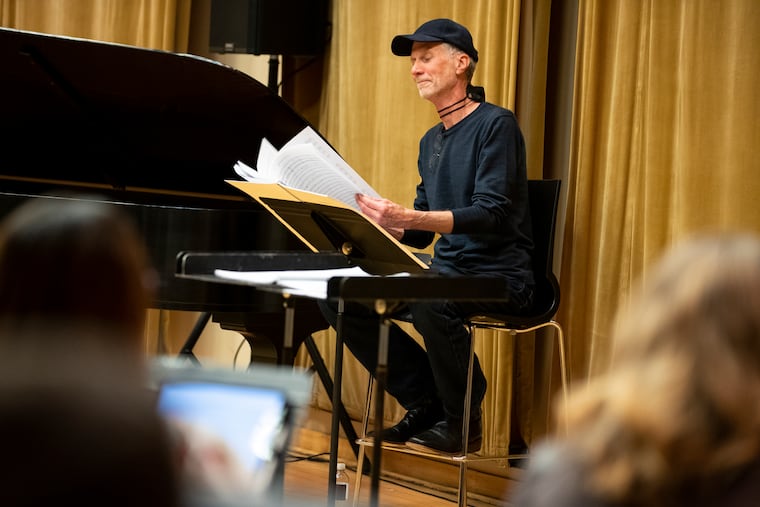John Luther Adams world premiere is a prayer to Earth as we know it
The opening movement in the piece about the decline of Planet Earth is succinct, covering 2 billion years of rock formation in less than 15 minutes

Long known as America’s “eco-composer,” John Luther Adams goes to the depths of the Grand Canyon and into the Colorado River in his new piece, Vespers of the Blessed Earth, with the Philadelphia Orchestra and the Crossing choir in tow.
Performances start March 30 in Verizon Hall and will feature a warm bath of choral sound (to judge from the weekend rehearsals), while naming the rocks and their colors along the way: “Redwall Limestone, deep red, brown, Temple Butte Limestone, purple, grey, Bright Angel Shale, green, tan, brown...”
The opening movement in a piece about the decline of Earth is succinct and earnest, covering 2 billion years of rock formation in less than 15 minutes.
“It’s probably the most personal and overtly expressive music I’ve ever composed,” the Pulitzer Prize-winning Adams said by phone from New Mexico. “I think it’s because I feel this so deeply for our fellow human beings on this beautiful planet.”
As much as the piece suggests a reverent requiem for the Earth as we now know it, the Vespers in the title is intentional. Adams — who believes “the practice of my art is the practice of my faith” — chose a genre with a less-formal, more open-ended tradition, and one that traditionally has prayers sung at nightfall as darkness descends. One of the five movements, “Aria of the Ghost Bird,” has a solo soprano vocalizing an unanswered mating call based on a field recording of the now-extinct Kaua’i ‘O’ō — a long-beaked, dark blue bird that died out around 1987. No words. Just an elegy.
Another movement, “Litanies of the Sixth Extinction,” lists 193 plants, birds, and animals that are headed toward extinction. “When you just present names, there’s a lot of space for the listener to go where they need to go — or where the music takes them,” said Crossing conductor Donald Nally.
The piece was to have been led by orchestra music director Yannick Nézet-Séguin in a program with Stravinsky’s The Rite of Spring, both in Philadelphia and at Carnegie Hall. The conductor is sick, however, the orchestra announced Thursday, and now Nally will lead the Adams. Podium duties for the Stravinsky will be split between veteran conductor Marin Alsop and orchestra conducting fellow Austin Chanu.
Originally a child of rock and roll, the Mississippi-born Adams, now 70, spent formative years living in Alaska, from 1978 until 2014, the year he was awarded the Pulitzer for the orchestral work Become Ocean. Vespers is the third piece Adams has written for the Crossing. What is a first in this premiere is the collaboration between the Philadelphia Orchestra (which commissioned the piece) and the choral group. Crossing, which has commissioned some 160 pieces over its 18-year existence is venturing out of its Presbyterian Church of Chestnut Hill headquarters to perform with the Los Angeles Philharmonic and the New York Philharmonic.
The Crossing gravitates toward visionary composers. The choir’s long association with New York’s much-awarded Bang-on-a-Can composer collective includes the June 1-3 premiere of Julia Wolfe’s unEarth with the New York Philharmonic at Lincoln Center. Later this summer, the Crossing premieres a new work by Ted Hearne titled Farming — that Nally describes as not being part of any previously-known genre — June 22-25 at King Oaks Farm in Bucks County.
The Philadelphia Orchestra performs “Vespers of the Blessed Earth” March 30 at 7:30 p.m., April 1 at 8 p.m. and April 2 at 2 p.m. Tickets: $22-$168. philorch.org, 215-893-1999.